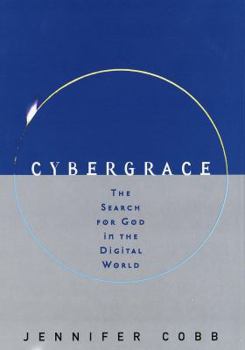CyberGrace: The Search for God in the Digital World
Select Format
Select Condition 
Book Overview
Theologian and high-tech consultant Jennifer Cobb combines her expertise to create a new theory of the Divine in the Information Age. As computers and artificial intelligence systems become more sophisticated, the question of whether we can find spiritual life in cyberspace is beginning to be asked. CyberGrace: The Search for God in the Digital World is a bold, thought-provoking, affirmative answer to one of the most intriguing inquiries of our time. Until now, an unbridgeable schism has separated the world of the spirit and that of the machine. According to an increasingly compelling concept known as emergence, the gulf may be an imaginary one. Fifty years ago, Jesuit paleontologist Teilhard de Chardin combined his lifelong passions of God and science to predict the emergence of cyberspace, based on his studies of evolution. Using Teilhard's theories as a starting point, Jennifer Cobb asserts that as technical systems become more complex--with simple, predictable mechanisms coalescing into hierarchies of increasing organization--something elegant, inspired, and absolutely unpredictable simply and suddenly "emerges." Many observers today see this "hand of God" showing itself in disparate disciplines, from evolutionary theory to artificial intelligence--and especially in the furthest realms of cyberspace, where brute computation seems to give way to divine inspiration. CyberGrace offers paradoxical evidence that our machines may be conduits to a deeper spirituality. With daily headlines announcing dizzying advances in science and information technology, many people wonder about their--and their children's--ability to lead lives imbued by a sense of the sacred. In the new world, where the search for spirituality may seem scattered and unfocused, Cobb brilliantly uses the most popular and prevalent phenomenon of our times--the computer--to find a world filled with meaning and love.
Format:Hardcover
Language:English
ISBN:0517706792
ISBN13:9780517706794
Release Date:May 1998
Publisher:Crown
Length:258 Pages
Weight:1.00 lbs.
Dimensions:9.0" x 1.0" x 6.3"
Customer Reviews
4 ratings
Zen and the Art of Bootstrapping
Published by Thriftbooks.com User , 23 years ago
Don't let the fact that she mis-spelled it"Burners-Lee" detract from your enjoymentof Cybergrace.I'm a typical left-brained type, and boughtthis book partly because I knew some ofthe Deep Blue (chess machine) people whenthey were at CMU. No theologian am I.I discovered a well-written, concise, andengrossing book, and have come to regard Cobb'sbook as a little gem. In recent years I'vebought several copies for friends. The bookcovered a wide range of topics which werenew to me, and really was a catalyst forfurther exploration. The time was ripe forme, when the book was first published.Chapter 1 - Spiritual Evolution, creativity in processChapter 2 - Emergence, Whitehead, John B. Cobb, Process theologyChapter 3 - Teilhard de Chardin, noosphereChapter 4 - Holons, Ken WilberChapter 5 - Princeton Engineering Anomalies Research (PEAR) laboratory, quantum consciousnessChapter 6 - Complexity, emergent computationChapter 7 - Virtual Reality, Immersive technologies, asceticismChapter 8 - Ethics, Spirit in Action
The God of Process in the Process World of Cyberspace
Published by Thriftbooks.com User , 23 years ago
Jennifer Cobb explores a sense of encounter with the Divine in relation to cyberspace, which she concludes is essentially a world of processes -- and hence a perfect medium for finding the God of Process Theology.The book has some superb reflections upon the nature of realities that can be found in a cyber dimension of the lives we live. This, in fact, is the great strength of this book. If the reader has a strong appreciation for Process thought, this is a book that will be of interest. Those who come to it with more of a traditional Incarnational theology (rooted in Christianity) may find some of her optimism about disembodied minds to be a bit disturbing -- a disembodied ANYTHING is a problem for Incarnational thinkers. Cobb heightens some of the problems inherent in Process thought and adds to them.With all of the book's strengths and weaknesses, on balance I feel the book is very good and well worth the read. In fact, I recommend it.
Read this book.
Published by Thriftbooks.com User , 23 years ago
This book is challenging in the good way. You may have more questions than answers by the time you've reached the last page, but these will be questions you'd never have thought to ask without having read Cobb's book. A great introduction to Tielhard de Chardin.
A modern version of Augustine's The City of God
Published by Thriftbooks.com User , 25 years ago
If you have always yearned to read The City of God by Augustine, but have not had the time or patience, then Cybergrace, by Jennifer Cobb may be your best substitute. Ms. Cobb is well versed in both philosophy and current technology. She draws on this extensive knowledge to create an understanding of "God" and spirit which rises high above the "Master of the Universe" image which resulted from modernism. Just as Augustine's City made his contemporaries feel at home, Cobb's place leaves us with a sense of purpose and wonder. If only for a moment, we are able to put aside our skepticism and distrust for the unseen world and enter into a place that is clearly our promised land. Although it would be helpful to read The Divine Mileau by Tielhard de Chardin as a prelude to Cybergrace, it is not necessary. Cobb delivers her message in a style that would have met with the approval of Thomas Acquinas. It is crisp, to the point, understandable and easily refutated if one so desires. Like Augustine, Cobb fails to deal with the question of evil. So when the glow begins to depleat, fear returns and we must return to the world of violence, death and who knows what on the other side.






